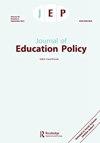Privatising public schools via product pipelines: Teach For Australia, policy networks and profit
IF 2.8
2区 教育学
Q1 EDUCATION & EDUCATIONAL RESEARCH
引用次数: 0
Abstract
Drawing upon a long-term study of venture philanthropy and public schools in Australia, this paper focuses on Teach For Australia (TFA) as a major component of a venture philanthropic network, one that builds critical infrastructures and connections between non-government organisations and the state, creating a product pipeline into public schools. Utilising interviews with staff from Teach For Australia and venture philanthropic organisations, comprehensive and rigorous financial data, reviews, reports and website data, the analysis aims to identify the major philanthropic funders, individual actors and private foundations that leverage Teach For Australia, illustrating how this network develops for-profit pathways into public schools. In pushing a deficit framing of public schools, these networks incur privatisation effects, including flows of money, resources and key decision-making. They compromise the democratic principles upon which public schools are ideally based, in that the most disadvantaged public schools are opened up to ‘entrepreneurial’ and risk-taking corporate behaviour to test out teachers, products and services. By examining streams of revenue, partnerships and networks, we show how the purportedly non-profit Teach For Australia develops for-profit opportunities and business partnerships nested in corporate philanthropy, resulting in a privatisation effect on public schools.通过产品管道将公立学校私有化:为澳大利亚而教,政策网络和利润
通过对澳大利亚风险慈善和公立学校的长期研究,本文将重点放在“为澳大利亚而教”(TFA)作为风险慈善网络的主要组成部分,该网络建立了关键的基础设施,并在非政府组织和国家之间建立了联系,创造了进入公立学校的产品管道。通过对“为澳大利亚而教”的工作人员和风险慈善组织的采访,全面而严格的财务数据、评论、报告和网站数据,该分析旨在确定利用“为澳大利亚而教”的主要慈善资助者、个人行为者和私人基金会,说明该网络如何发展营利性途径进入公立学校。在推动公立学校赤字框架的过程中,这些网络引发了私有化效应,包括资金、资源和关键决策的流动。它们损害了公立学校理想基础的民主原则,因为最弱势的公立学校向“创业”和冒险的企业行为开放,以测试教师、产品和服务。通过研究收入流、合作伙伴关系和网络,我们展示了所谓的非营利组织“为澳大利亚而教”如何在企业慈善事业中开发营利性机会和商业伙伴关系,从而对公立学校产生私有化效应。
本文章由计算机程序翻译,如有差异,请以英文原文为准。
求助全文
约1分钟内获得全文
求助全文
来源期刊

Journal of Education Policy
EDUCATION & EDUCATIONAL RESEARCH-
CiteScore
8.10
自引率
8.00%
发文量
25
期刊介绍:
The Journal of Education Policy publishes original, critically and theoretically informed research that discusses, analyses and debates policymaking, policy implementation and the impact of policy at all levels and in all facets of formal and informal education. The journal is interested in analysis and theorisation of policy that is transposable, that has generic interest and relevance - national policy case studies would need to be conceptually and/or methodologically generalisable. The journal also publishes work that presents new methods of research and research studies that are experimental and innovative. The journal offers a forum for theoretical debate, as well as historical, philosophical and comparative studies, across different countries, contexts and levels of education. A valuable resource for academics, researchers, educators and policy makers, Journal of Education Policy provides rigorous and original insights into educational policy development, implications and global impact.
 求助内容:
求助内容: 应助结果提醒方式:
应助结果提醒方式:


